
Guests
- Diana ButtuPalestinian human rights attorney.
- Amjad Iraqisenior Israel-Palestine analyst at the International Crisis Group.
A ceasefire came into effect in Gaza on Friday after the Israeli government approved the first phase of the U.S.-backed plan to end two years of war in the Palestinian territory. The deal calls for a pause in Israeli attacks, the release of the remaining Israeli captives held by Hamas in exchange for Palestinians detained in Israeli prisons, as well as an influx of badly needed humanitarian aid for the starving population of Gaza. Israeli forces have pulled back but continue to control roughly half the territory, with the ceasefire agreement calling for further withdrawals in later phases.
“This is a deal that really should have been made long, long ago,” says Amjad Iraqi, a senior analyst at the International Crisis Group. “We’ve known that the parameters of this truce have been on the table for well over a year, if not since the very beginning of the war.”
Palestinian human rights attorney Diana Buttu says while people are happy for a pause in the slaughter, she finds it “repulsive” that Palestinians had to bargain with their own oppressors. “It should have been that the world put sanctions on Israel to stop the genocide, rather than forcing Palestinians to negotiate an end to it.”
Transcript
AMY GOODMAN: Israel’s government has approved the first phase of the Gaza ceasefire deal, that includes a pause in Israeli attacks and the release of the remaining hostages held by Hamas in exchange for Palestinians detained in Israeli prisons. President Trump announced yesterday the Israeli hostages will be released from Gaza on Monday or Tuesday as he plans to travel to the Middle East.
According to the deal, 250 Palestinian prisoners serving life sentences and another 1,700 people from Gaza detained in the last two years would be released. Hamas has demanded the release of prominent Palestinian political prisoner Marwan Barghouti, but his name was reportedly secretly removed from the prisoner exchange list by Israel.
Meanwhile, the U.S. is sending about 200 troops to Israel to monitor the ceasefire deal.
The Israeli military Friday confirmed the ceasefire had come into effect as soldiers retreated from parts of Gaza. Tens of thousands of Palestinians, including families that had been forced to the south, began their trek back to northern Gaza after news that Israeli forces were withdrawing.
Returning Gaza City residents made their way through mounds of rubble and destroyed neighborhoods, searching for any sign of their homes and belongings. Among them, Fidaa Haraz.
FIDAA HARAZ: [translated] I came since the morning, when they said there was a withdrawal, to find my home. I’m walking in the street, but I do not know where to go, due to the extent of the destruction. I swear I don’t know where the crossroads is or where my home is. I know that my home was leveled, but where is it? Where is it? I cannot find it. What is this? What do we do with our lives? Where should we live? Where should we stay? A house of multiple floors, but nothing was left?
AMY GOODMAN: Al Jazeera reports Israel’s army said it would allow 600 humanitarian aid trucks carrying food, medical supplies, fuel and other necessities daily into Gaza, through coordination with the United Nations and other international groups.
On Thursday, the exiled Hamas Gaza chief Khalil al-Hayya declared an end to the war.
KHALIL AL-HAYYA: [translated] Today, we announced that we have reached an agreement to end the war and aggression against our people and to begin implementing a permanent ceasefire, the withdrawal of the occupation forces, the entry of aid, the opening of the Rafah crossing in both directions and the exchange of prisoners.
AMY GOODMAN: Israeli Prime Minister Benjamin Netanyahu spoke today in Israel.
PRIME MINISTER BENJAMIN NETANYAHU: [translated] Today, we mark one of the greatest achievements in the war of revival: the return of all of our hostages, the living and the dead as one. … This way, we grapple Hamas. We grapple it all around, ahead of the next stages of the plan, in which Hamas is disarmed and Gaza is demilitarized. If this can be achieved the easy way, very well. If not, it will be achieved the hard way.
AMY GOODMAN: In the United States, President Trump hailed his administration’s ceasefire plan during a Cabinet meeting Thursday as concerns mount regarding potential U.S. and foreign intervention in the rebuilding of Gaza.
PRESIDENT DONALD TRUMP: Gaza is going to be slowly redone. You have tremendous wealth in that part of the world by certain countries, and just a small part of that, what they — what they make, will do wonders for — for Gaza.
AMY GOODMAN: For more, we’re joined by two guests. Diana Buttu, Palestinian human rights attorney, former adviser to the negotiating team of the Palestine Liberation Organization. She’s just recently written a piece for The Guardian. It’s headlined “A 'magic pill' made Israeli violence invisible. We need to stop swallowing it.” And Amjad Iraqi is a senior Israel-Palestine analyst at the International Crisis Group, joining us from London.
We welcome you both to Democracy Now! Diana Buttu, let’s begin with you. First, your response to the ceasefire-hostage deal that’s just been approved by the Israeli government and Hamas?
DIANA BUTTU: Well, first, Amy, it’s really quite repulsive that Palestinians have had to negotiate an end to their genocide. It should have been that the world put sanctions on Israel to stop the genocide, rather than forcing Palestinians to negotiate an end to it. At the same time, we’re also negotiating an end to the famine, a famine that Israel, again, created. Who are we negotiating with? The very people who created that famine. And so, it’s really repugnant that this is the position that Palestinians have been forced to be in.
And so, while people here are elated, happy that the bombs have stopped, we’re also at the same time worried, because we’ve seen that the international community, time and again, has abandoned us. Everybody is happy that the Israelis are going home, but nobody’s talking about the more than 11,000 Palestinians who are currently languishing in Israeli prisons, being starved, being tortured, being raped. Many of them are hostages picked up after October of 2023, being held without charge, without trial, and nobody at all is talking about them.
So, while people are happy that the bombs have stopped, we know that Israel’s control has not at all stopped. And it’s made it — Israel has made it clear that it’s going to continue to control every morsel of food that comes into Gaza. It’s going to control every single construction item that comes into Gaza. And it’s going to continue to maintain a military occupation over Gaza.
This is not a peace agreement. This is not an end to the occupation. And I think it’s so important for us that we keep our eyes on Gaza and start demanding that Israel be held to account, not only for the genocide, but for all of these decades of occupation that led to this in the first place.
AMY GOODMAN: Can you talk about the exchange of hostages, Israeli hostages, dead and alive, and Palestinian prisoners? According to the Hamas Gaza chief, I believe they’re saying all women and children, Palestinian women and children, picked up over these last two years — or is it beyond? — are going to be released. And then, of course, there are the well over a thousand prisoners who are going to be released.
DIANA BUTTU: No, not quite. So, there are 250 who are political prisoners who are going to be released, and that list just came out about a little over an hour ago. But there are also 1,700 Palestinians, solely from Gaza, who are going to be released. And these were people — these are doctors, these are nurses, these are journalists and so on, who were — who Israel picked up after the 7th of October, 2023, and has been holding as hostages. These are the people that are going to be released. There are still thousands more, Amy, that are from the West Bank, that we do not know what is going to happen to them.
And so, while the focus is just on the people in Gaza — and again, there is no path for freeing all of those thousands of Palestinians who are languishing in Israeli prisons, being starved, being tortured, being raped. What’s going to happen to them? Who’s going to be focusing on them? I don’t think that it’s going to be this U.S. administration.
AMY GOODMAN: I want to talk about the West Bank in a minute. More than a thousand Palestinians have been killed in the West Bank just over the last two years. But I first want to get Amjad Iraqi’s response to this deal that has now been signed off on. I mean, watching the images of tens of thousands, this sea of humanity, of Palestinians going south to north, to see what they can find of their homes in places like Gaza City, not to mention who’s trapped in the rubble. We say something — well over 60,000 Palestinians have been killed, but we don’t know the real number. It could be hundreds of thousands.
AMJAD IRAQI: Indeed, Amy. And to kind of continue off of Diana’s points, this is a deal that really should have been made long, long ago. We’ve known that the parameters of this truce have been on the table for well over a year, if not since the very beginning of the war, what they used to define as an all-for-all deal, the idea that Hamas would release all hostages in exchange for a permanent ceasefire. And the reasons for the constant foiling of it are quite evident. And it’s important to recognize this not for the sake of just lamenting the lives, the many lives, that have been lost and the massive destruction that could have been averted, but it needs to really inform the next steps going forward.
The biggest takeaway of what’s happening right now is that in order for a ceasefire to be sustained, in order for Gaza to be saved from further military assault, you need massive political pressure. And we’ve seen this really build up in the past weeks and months. You saw this, for example, from European governments, which, even through the symbolic recognition of Palestinian statehood, was very much venting their frustration with the Israeli conduct in the war, the fact that the EU was actually starting to contemplate more sort of punitive measures against Israel, such as partial trade suspensions, potential sanctions against Israel. We saw this building up over the past few weeks. Arab states have started to use much of their leverage, especially after Israel’s strike on Doha or on Hamas’s offices in Doha. We started seeing Gulf and other Arab and Muslim states come forward to President Trump at the U.N. saying that Israel aggression cannot continue like this.
And most crucially is, of course, President Trump himself and of Washington finally saying that it needs to put its foot down to stop this war, which we’ve heard repeatedly from Trump himself. But this is really the first time since the January ceasefire agreement where Trump has really insisted that this come to an end.
Now, this — now there’s much to be sort of debated about the Trump plan itself, but this aspect of the truce cannot continue, and certainly cannot save Palestinian lives, unless that pressure is maintained. The concern now is that that pressure will recede or alleviate, because there’s now a deal that’s signed. But, actually, in order to enforce it, that pressure really needs to be maintained.
AMY GOODMAN: What do you think was the turning point, Amjad? The bombing of Qatar? Now, I mean, The New York Times had an exposé that Trump knew before, not just in the midst of the bombing, that Israel was bombing their ally to try to kill the Hamas leadership. But do you think that was the turning point?
AMJAD IRAQI: It certainly might have expedited, I think, a lot of factors that were already building up. As I said, pressure had been mounting against Israel for quite a while. There was really outrage, not just at the continuance of the military assaults, but the policy of starvation, which was very evident on the ground, and Israel’s complete refusal to let in aid, its failed project with — through the Gaza Humanitarian Foundation.
So, this had all been building, but I do think the strike on Doha really pushed Arab states to say that enough is enough. To see them really meet all together with President Trump and create a bit more of a united position to insist that this really couldn’t go on, I think, has really signaled that Israel really crossed a certain line geopolitically. Now, of course, that line should have been recognized as being crossed well before because of the facts on the ground in Gaza, but I do think that this has helped to kind of push things over the edge a bit more assertively.
There are also speculations about Trump, of course, trying to have his name in for the Nobel Peace Prize, and potentially other factors. But I do think that the timing of this, again, regardless of what ended up pushing it over the line, it is unfortunate that it has really taken this long. And it’s really up to global powers and foreign governments to recognize that in order to make sure that this stays, that they really need to keep that pressure up.
AMY GOODMAN: And, Amjad Iraqi, the core demand of the ceasefire is that Hamas disarm and end its rule. What security guarantees is Hamas seeking for its own members to lay down their arms and not face a wave of arrests or assassinations? How is this going to work? And talk about who you see running Gaza.
AMJAD IRAQI: So, these things are still a bit unclear. So, throughout the ceasefire talks, Hamas has kept insisting about the idea of U.S. guarantees that Israel will not end the war. But there’s never really any clear, concrete way to prove this. And as we’ve seen before, like in the January ceasefire deal and in much of the ceasefire talks, even if President Trump expresses his desire to see an end to the war, oftentimes he would still hand the steering wheel to Prime Minister Netanyahu. And if Netanyahu decided that he wanted to thwart the ceasefire talks, if he wanted to relaunch military assaults, and the Israeli military and the government would back it, then Trump and Washington would fall into line and amplify those calls, and even President Trump himself would sort of cheer on the military assaults.
And so, this factor has certainly weighed a lot on Hamas, but I do think there’s a culmination of pressure, the fact that Arab states have insisted on Hamas to try to show, at least signal, certain flexibility, even though many of its demands have been quite consistent throughout the war. But the fact that I think Hamas is now feeling that there’s also a bit more pressure on Israel to actually ensure that they at least try to take the gamble that they will not return to war.
And in regards to decommissioning and disarmament, publicly Hamas has placed a red line around this right to bear arms. But historically, and even recently, they do say that they are willing to have conversations about decommissioning, as long as it’s tied to a political framework, especially one that’s tied to the establishment of a Palestinian state. Now, one can really debate how much this process is actually quite feasible, and obviously the Israeli government and much of the Israeli public is quite adamant in its opposition against Palestinian statehood, but Hamas may at least offer some space for those conversations to be had. There are discussions about it potentially giving up what it might describe as its larger or more offensive weaponry, like rockets or anti-tank missiles. And there’s bigger questions around firearms.
But I think it’s important to put this question not as a black-and-white issue, as something that has to come first in the political process, as Israel is demanding, but one that requires trust building and confidence building in the rubric of a process of Palestinian self-determination. This is important not just in the case of Palestine, but across many conflicts around the world where the question of decommissioning, about establishing one rule, one gun, one government for a society, requires that kind of process. So, it shouldn’t just be a policy of destroying and military assaults and so on. You do need to engage in these questions in good faith.
AMY GOODMAN: There are so many questions, Diana Buttu, in this first stage of the ceasefire-hostage deal, is really the only one that Netanyahu addressed today in his speech. You’re usually in Ramallah. You spend a lot of time in the West Bank. Where does this leave the Palestinian Authority? I don’t think the West Bank is talked about in this deal. And what about the fact that we’re looking at pictures of Netanyahu surrounded by Steve Witkoff on one side and Jared Kushner, who has talked about — as we know, famously referred to Gaza as “very valuable” waterfront property?
DIANA BUTTU: Well, I think that this plan was really an Israeli plan, and it was repackaged and branded as a Trump plan. And you can see just in the text of it and the way that all of the guarantees were given to the Israelis, and none given to the Palestinians, it’s really an Israeli plan.
But beyond that, it’s important to keep in mind that when Trump was going around and talking about this plan, that he consulted with everybody but Palestinians. He didn’t talk to Mahmoud Abbas. He didn’t even let Mahmoud Abbas go to the U.N. to deliver his speech before the U.N. I’m pretty certain he didn’t speak to the U.N. representative, Palestine’s representative to the U.N. And so, this is — once again, we’ve got a plan in which people are talking about Palestinians, but never talking to Palestinians. So, again, this is very much an Israeli plan repackaged as a Trump plan and branded as a Trump plan.
In terms of them looking at Gaza as being prime real estate, this is not at all different from the way that they’ve done it in the past, and this is not at all the way that Israel has looked at Palestine. And this is because this is the way that colonizers look at land that isn’t theirs. They ignore the history of the place. Gaza is an — has an old history. It has some of the oldest churches, I think the second-oldest church in the world. It has some of the oldest mosques. It has an old civilization. We want Gaza to be Gaza. We don’t want it to be Dubai or any other place. We want it to be Gaza. And so, the idea of somehow turning it into prime real estate, this is the mentality of somebody who’s coming from outside. This is the way that colonizers think. This isn’t the way that the Indigenous think. And so, you can see in this plan that it’s not only the idea of the outside coming in, but they certainly didn’t consult Palestinians at all.
As for what’s going to happen to the Palestinian Authority, it’s clear that they don’t want the Palestinian Authority in the Gaza Strip, and it’s clear that they do want to have a foreign authority in the Gaza Strip. But once again, Amy, when is it that Palestinians get to decide our own future? Are we really going back to the era of colonialism, when other people get to decide our future? And that’s what this plan is really all about.
AMY GOODMAN: Well, we’re going to be continuing to cover this story. President Trump is expected to be there for the signing of the ceasefire in Sharm El-Sheikh in Egypt on Sunday, and the hostages and prisoners are expected to be released on Monday or Tuesday. Diana Buttu, I want to thank you for being with us, Palestinian human rights attorney, former adviser to the negotiating team of the Palestine Liberation Organization, and Amjad Iraqi, Israel-Palestine analyst at the International Crisis Group.
When we come back, the Nobel Committee recognizes a leading U.S.-backed Venezuelan opposition leader, the announcement coming as Venezuela is facing mounting threats from the Trump administration, which has repeatedly bombed boats off the coast of Venezuela. We’ll speak with the Pulitzer Prize-winning historian Greg Brandon. Stay with us.
[break]
AMY GOODMAN: The Tunisian American artist Emel, Emel Mathlouthi, performing “Kelmti Horra (My Word Is Free)” at the 2015 Nobel Peace Prize Concert in Oslo.

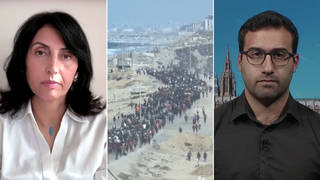
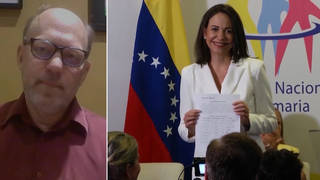
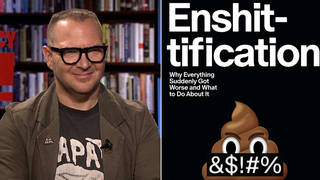





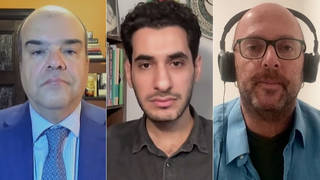
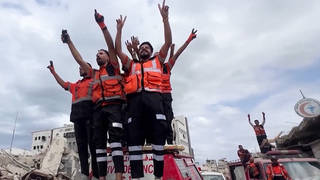
Media Options